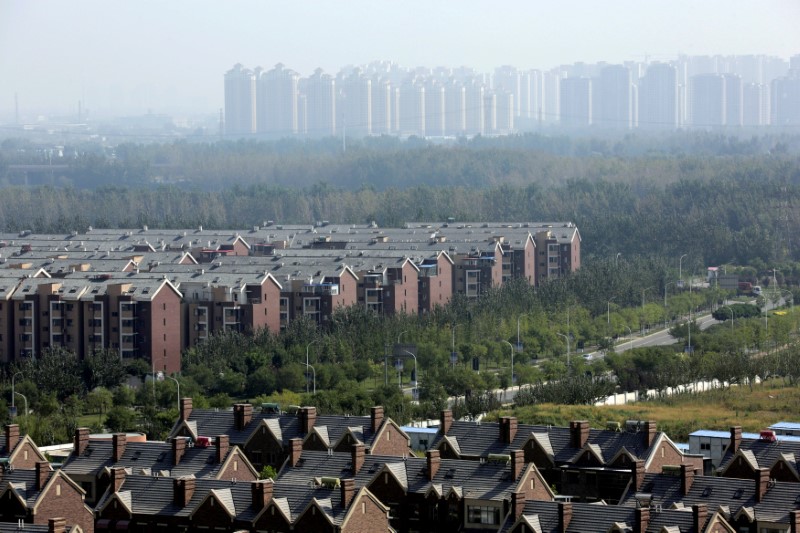By Yawen Chen and Ryan Woo
BEIJING (Reuters) - Home prices in Beijing fell for the first time in more than two years in June, while Shanghai declined further and Shenzhen stalled, pointing to significant cooling in China's biggest real estate markets, official data showed on Tuesday.
Nationwide, home price growth slowed slightly last month as government restrictions to keep prices in check weighed on larger cities, though smaller cities maintained rapid growth due to less severe checks.
Big cities such as Beijing have acted swiftly this year to quell speculative property buying that have shattered price records and fueled concerns about housing affordability.
Worries about growing household leverage have been joined by anxiety over China's addiction to debt, which authorities have been trying to curb over the past year in an effort to defuse financial risks.
The latest data suggests the real estate sector is cooling off at a moderate pace and is unlikely to suffer a steep correction as some had feared.
In June, average new home prices in China's 70 major cities rose 10.2 percent from a year earlier, decelerating from May's 10.4 percent gain, according to Reuters calculations based on data issued by the National Bureau of Statistics (NBS).
On a monthly basis, new home prices rose 0.7 percent in June, the same as the previous month's reading, the calculations showed.
"Sales declines in the biggest cities were quite significant, so prices are certainly not going to rebound," said Rosealea Yao, a property economist with Gavekal Dragonomics.
"The mild declining trend will continue through at least the first half of 2018," Yao said.
More than 45 cities, most of them top-tier cities with a sizable population, have imposed varying levels of restrictions since last October to curb fast-rising prices, with most of the latest measures introduced in late March.
The cooling effect is most visible in China's the biggest cities. Price growth in Shenzhen, Shanghai and Beijing slowed to 2.7 percent, 8.6 percent and 10.7 percent, respectively, from a year earlier.
From a month earlier, prices in Beijing fell 0.4 percent, marking the first fall since February 2015. Shanghai prices slipped by a further 0.2 percent, while Shenzhen prices remained unchanged.
DECLINING SALES
The value of new personal home mortgages in Beijing, Shanghai and Shenzhen in the first half of 2017 was equal to 30 percent of the total value of home loans in 2016, a Chinese state newspaper reported.
Still, real estate investment and sales growth both sped up in June after slowing in May, most likely due to more robust demand in smaller centers that have been encouraged to reduce inventory and are not subject to the strict curbs at work in bigger cities.
Luoyang, a third-tier city in central Henan province, topped the list in June, with prices of new units up 2.3 percent on month, compared with a 1.3 percent gain in May, taking the annual growth to 10.2 percent.
That has also been reflected in stronger credit demand in the month from households.
Keeping a lid on price fluctuations has become a priority for policymakers in a politically important year, with a major leadership reshuffle expected this autumn.
But to make sure the market is neither too hot nor too cold, authorities have increasingly resorted to administrative measures that many analysts warn are anti-market in nature.
For example, sales prices for new units in a few cities like Zhengzhou - capital of Henan - are not allowed to be higher than the price level seen last October for new units in the vicinity.
FADING AFFORDABILITY
The upsurge in house prices since 2001 in most major Chinese cities has spurred growing concerns about affordability.
A typical two-bedroom new home in Beijing now costs around 6 million yuan ($870,000), about 69 times the average per capita disposable income in the city, much higher than the ratio of less than 25 times for New York City.
Economists worry that slowing growth in incomes, which had been rising at double-digit rates for decades, will no longer be able to cushion financial risks in an extremely inflated housing market.

On average, China's disposable income was up 8.1 percent on-year for city-dwellers in the first half of the year, official data showed, slower than the 10.2 percent annual property price growth in June.